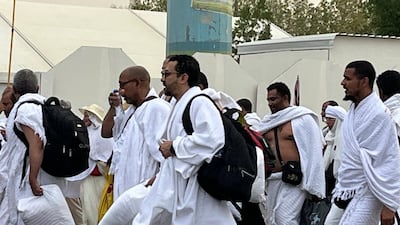This year's Hajj has presented an great opportunity for many Muslims to atone for the sins they committed over the past three years, owing to the pilgrimage being restricted amid the Covid-19 pandemic.
The son of a Kenyan millionaire spent more than half a million dollars from his father’s will to help 120 people to perform their first Hajj.
Ahmed Soliman, 43, had never performed Hajj himself but found himself leading a group of Kenyan Muslims to answer the call of God.
“I was busy with life and religion was never my strongest point. I would like to make an excuse that I was helping my father making millions, so I did not have time for prayers and other things that make a good Muslim,” he told The National.
His father, Suleiman Said, who died last February, made his fortune in the construction business and left in his will instructions that part of his estate should finance pilgrims in 2022.
But many of the people at this year’s Hajj have stories to tell — often littered with hardships.
Former taxi driver Juma Ismail, who is part of Mr Suleiman's group, was left in a wheelchair after a road accident.
“I am eternally grateful for their generosity because there is no way I could earn enough money to be here,” Mr Ismail, said.
Tasneem Qassim, a Pakistani who was working in Kuwait, was left in a similar situation after crushing his right leg in a fall.
“I was a bricklayer of a construction company in Kuwait and had a 10-foot fall from a wall that left my right leg needing an amputation. That was back in 2017. I did not believe when I got a call that my application for Hajj was approved from kind donors in Karachi,” Mr Qassim told The National.
In October last year, schoolteacher Bakari Hassan came out of a prison in Tanzania penniless after committing a petty crime.
“I went to prison for not honouring six cheques and was sentenced to three months. I did not have a cent when I came out. I wanted to repent my sins and my friends came with enough money to send me here for Hajj,” the 34-year-old chemistry teacher said.
But for Waleed Al Mahrizi, with his high-pressure job as a manager with Oman’s state-run company OQ, Hajj presented a welcome opportunity to help others and bring some peace and a higher purpose into his life.
“I have paid for myself this Hajj, but I am also here to help a group of Omani pilgrims to adhere to safety procedures as an HSE expert. It brings peace in my heart to do it,” Mr Al Mahrizi said.

Most pilgrims had a positive experience in his year's Hajj, reassured by the many precautions issued by the Saudi Ministry of Hajj and Umrah and other participating authorities.
“The Saudi Hajj police did a commendable job in easing our three kilometre walk from Mina to Jamarat, and the traffic flow to different places,” said Kuwaiti pilgrim Said Al Hammali.
International pilgrims are expected on Wednesday to perform the Farewell Tawaaf after concluding three sessions of the stoning of the devil ritual.
“We did everything except the Farewell Tawaf that we are planning to do on Wednesday," said Mohammed Al Hashmi, an Iranian pilgrim.
"All went surprisingly well and we expect no problems on Wednesday, and praise to Lord and the Saudi authorities for taking care of us."
The Farewell Tawaf is the last ritual and pilgrims need to leave Makkah as soon as it is completed. It is not obligatory to perform it but it is highly recommended.
Most of the foreign pilgrims are expected to fly back home at the weekend.


